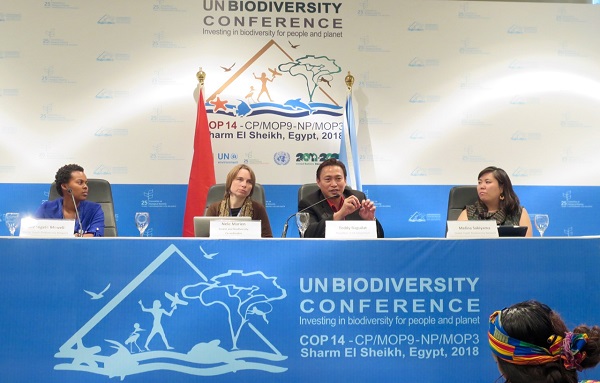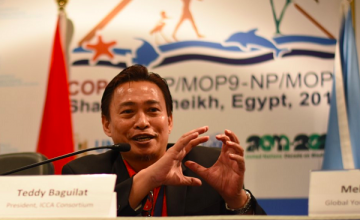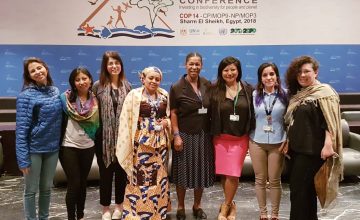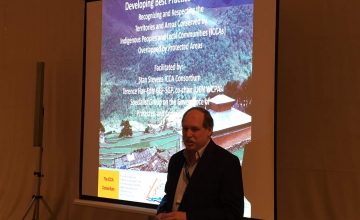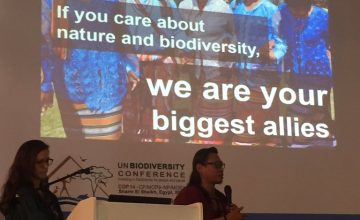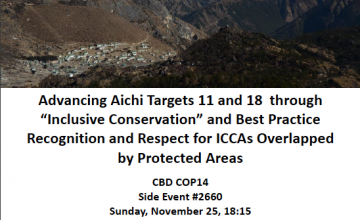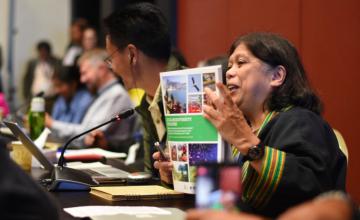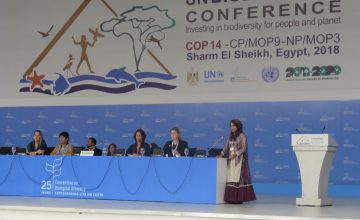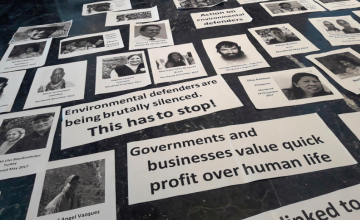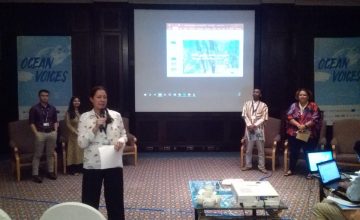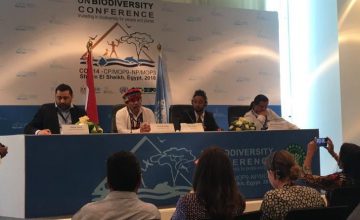First published on 11/30/2018, and last updated on 07/19/2022
By Holly Jonas, International Policy Coordinator
Since the beginning of the ICCA Consortium, a major focus has been to influence global biodiversity law and conservation policy, particularly the UN Convention on Biological Diversity (CBD) and International Union for Conservation of Nature (IUCN). We have used these fora to shape international policies and laws to recognise and support ICCAs—Territories of Life as a strategy to achieve and further conservation and other goals. This helps build political legitimacy for ICCAs at national levels and helps open up space for opportunities for partnerships, resource mobilisation and more.
The UN CBD has a two-year cycle of negotiations, with a number of intersessional meetings leading up to the biennial Conference of the Parties. The 14th meeting of the Conference of the Parties (COP 14) was held from 17-29 November 2018 in Sharm El Sheikh, Egypt. We had a strong delegation of Members and Honorary members who participated in all of the major observer caucuses (International Indigenous Forum on Biodiversity, CBD Alliance, Global Youth Biodiversity Network and Women’s Caucus). Through oral statements and direct engagement with government delegations, our Members and Honorary members influenced negotiations of several decisions, including on traditional knowledge, protected and conserved areas, climate change, the post-2020 biodiversity framework, and more.
Along with key decisions on Article 8(j) and related provisions, one of the most positive outcomes of COP14 was the decision on protected and conserved areas, which includes the most progressive text to date on governance and equity, as well as the first-ever definition of “other effective area-based conservation measures” (or ‘conserved areas’ in short) and guidance on identifying potential conserved areas. This is an important gain in international biodiversity law and one the ICCA Consortium should be proud of, having participated actively in the process to develop the definition and guidance on conserved areas as well as the guidance on governance and equity, key issues that we have been promoting in the CBD for at least 15 years. Parties also agreed on a process to develop the post-2020 biodiversity framework over the next two years, which is required to be inclusive, participatory and incorporate contributions of Indigenous peoples and local communities and civil society more broadly. All of the COP14 decisions can be downloaded in this dedicated page.
Parallel events
In addition to the negotiations, we participated in many events throughout COP14. We were closely involved in the Nature and Culture Summit (23-24 November) along with our partners from the UNDP GEF Small Grants Programme, CBD Secretariat and IIFB (see programme, declaration and more info ). Our co-organised panel session on community conservation shone a spotlight on ICCAs—Territories of Life, a grassroots critique of the Half Earth / Nature Needs Half debate, and community experiences from Iran (Council member Ghanimat Azhdari, Member Cenesta), Democratic Republic of the Congo (Council member Dominique Bikaba, Member Strong Roots), the Philippines (Teddy), Canada, Kenya, and more. Our Members and Honorary members also presented in other Summit sessions on Indigenous knowledge and climate change (Honorary member Nigel Crawhall and Hindou Oumarou Ibrahim, Member IPACC), human rights and biodiversity (Regional Coordinator Joseph Itongwa, Member ANAPAC RDC), gender (Tina Rai, Member GFC) and indicators (Honorary member Chrissy Grant and Joji Carino of Member Forest Peoples Programme). After a very busy weekend, it was an additional honour to have our Council member Ghanimat Azhdari selected by the CBD Secretariat to present a summary of the Sharm El-Sheikh Declaration on Nature and Culture during the main plenary.
We had a strong presence in the Rio Pavilion, including Aichi Target 11 Day’s session on governance and conserved areas and the launch of the Aichi Target 11 Partnership (see photos). As discussed during the General Assembly, the ICCA Consortium accepted the CBD Secretariat’s invitation to be part of the Aichi Target 11 Partnership, subject to certain conditions, as the global community redoubles efforts to achieve the Aichi Targets by 2020. During the “Sustainable Ocean Day: Ocean Voices” event, our Council member Vivienne Solis Rivera co-organised a session on “Voices of Ocean People” with the International Collective in Support of Fishworkers and a presentation by Henri Rakotoson from our Member TAFO MIHAAVO (Madagascar) (see photos).
The ICCA Consortium organised a workshop on the proposed IUCN Best Practice Guidelines on ICCAs and overlapping protected areas as well as a side event on the same topic with presentations on diverse experiences from around the world. The side event also served as the launch of our latest Policy Brief No. 5 (available in English at: Whose ‘Inclusive Conservation’?). Our Members and Honorary members also organised and participated in a wide range of other side events, press conferences and actions around the COP venue, including a silent demonstration to honour environmental defenders.
All in all, it was another strong display of our collective efforts and dedication to promoting ICCAs—Territories of Life in the UN CBD. We look forward to actively engaging with allies and partners over the next two years as we collectively work to meet the Aichi Targets on the ground, where it matters most, and to simultaneously develop an ambitious and equitable post-2020 biodiversity framework.
Key links for more information:
- Daily coverage of the negotiations and events by IISD’s Earth Negotiations Bulletin: http://enb.iisd.org/biodiv/cop14/enb/
- COP14 decisions: https://www.cbd.int/conferences/2018/cop-14/documents
- ICCA Consortium guidance note for participating in COP14: https://www.iccaconsortium.org/wp-content/uploads/2018/12/Guidance-Note-for-Participating-in-CBD-COP14.pdf
- Global Forest Coalition (Member) policy recommendations for COP14: https://globalforestcoalition.org/cbd-cop14-policy-recommendations/
- ICCA Consortium Policy Brief No. 5 (launched at COP14): Whose ‘Inclusive Conservation’?
- Local Biodiversity Outlooks (beta version launched at COP14): https://beta.localbiodiversityoutlooks.net/
- Short video of civil society demonstration to honour environmental defenders: https://drive.google.com/file/d/166kX1OXDTzqmp0E3khB_TnCXefRYL8-Q/view
- Short video of Council member Ghanimat Azhdari on the role of Indigenous peoples and women in biodiversity conservation: https://twitter.com/UNBiodiversity/status/1067811138501525504
- Mongabay article on the significance and implications of the COP14 decision on conserved areas: https://news.mongabay.com/2018/12/global-agreement-on-conserved-areas-marks-new-era-of-conservation-commentary/
- Guardian article on Amazonian Indigenous peoples’ proposal for a sacred corridor of life and culture (announced at COP14): https://www.theguardian.com/environment/2018/nov/21/amazon-indigenous-groups-propose-mexico-sized-corridor-of-life
- Protected Planet Report 2018 (launched at COP14): https://livereport.protectedplanet.net
Front picture: Teddy at civil society press conference – (c) Ghanimat Azhdari
